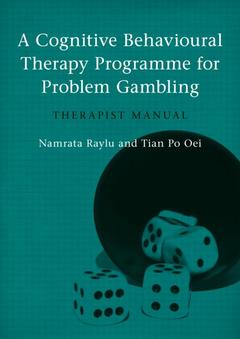Description
A Cognitive Behavioural Therapy Programme for Problem Gambling
Therapist Manual
Authors: Raylu Namrata, Oei Tian Po
Language: English
Subject for A Cognitive Behavioural Therapy Programme for Problem...:
Keywords
Problem Gambling; Home Exercises; gamblers; Gambling Behaviours; home; Elective Session; exercise; American Psychiatric Association; anonymous; Put; behaviours; Gambling Related Cognitions Scale; machines; Control Gambling; client's; Gamblers Anonymous; progress; Imaginal Exposure; elective; Gambling Outcomes; session; CBT Programme; Gambling Urges; Problem Gambling Behaviours; Impulse Control; CBT Approach; High Risk Situations; Motivational Interviewing Techniques; Start; Star; Treating Problem Gambling; CBT Group; Gambling Machines; Client's Gambling; Abdominal Breathing Exercises
85.02 €
In Print (Delivery period: 14 days).
Add to cartPublication date: 05-2010
Support: Print on demand
Publication date: 03-2016
· 17.4x24.6 cm · Hardback
Description
/li>Contents
/li>Readership
/li>Biography
/li>
This book is a treatment manual providing guidance for therapists treating clients with gambling addictions.
In this book the authors use a cognitive behavioural approach and provide a session by session guide for overcoming problem gambling. Essential topics covered include:
- assessment and psychoeducation
- cognitive behavioural strategies to stabilize gambling
- identifying and challenging thinking errors
- relaxation and imaginal exposure
- problem solving and goal setting
- managing negative emotions
- relapse prevention: maintaining a balanced lifestyle and coping with high risk situations
A Cognitive Behavioural Therapy Programme for Problem Gambling supplies detailed information to help the therapist and client understand gambling behaviours, as well as practical advice on techniques that can be used with the client to change these behaviours.
This practical guide will provide helpful guidance for addiction counsellors and therapists worldwide.
Overview. Review of the Problem Gambling Treatment Literature. Session One: Assessment. Session Two: Psychoeducation and Self-management Strategies to Stabilize Gambling. Session Three: Cognitive-restructuring I: Identifying Gambling Specific Thinking Errors. Session Four: Cognitive-restructuring II: Challenging Gambling Specific Thinking Errors. Session Five: Cognitive-restructuring III: Identifying and Challenging Other/General Thinking Errors. Session Six: Relaxation and Imaginal Exposure. Session Seven: Problem Solving and Goal Setting Skills Training. Session Eight: Management of Negative Emotions. Session Nine: Relapse Prevention and Maintenance of Therapeutic Gains I: Balanced Lifestyle. Session Ten: Relapse Prevention and Maintenance of Therapeutic Gains II: Coping with High Risk Situations. Elective Session: Assertiveness Skills Training. Elective Session: Getting Out of Debt. Elective Session: Teaching Significant Others Strategies to Cope/Deal with the Gambler’s Behaviors. Appendices.
Namrata Raylu has been involved in a number of research activities in the area of addictive behaviours over the last 12 years and has published in the problem gambling area. Currently, she works as a research collaborator at the Psychology Department, University of Queensland and as a clinical psychologist in private practice.
Tian Po Oei has published widely in the areas of substance, anxiety and mood disorders and processes of change in psychotherapy, especially CBT in Asian cultures. Currently, he holds a personal Chair in Clinical Psychology at the University of Queensland and is the Director of the CBT Unit at Toowong Private Hospital.




